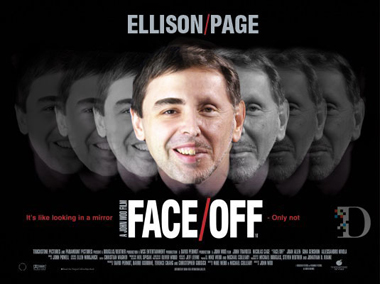It’s On: Oracle and Google to Meet in “World Series” of IP Lawsuits
 On Monday, what is being described as the “World Series of intellectual property trials” will get under way with jury selection in a federal court in San Francisco.
On Monday, what is being described as the “World Series of intellectual property trials” will get under way with jury selection in a federal court in San Francisco.
The parties are the software giant Oracle and the Internet concern Google. At issue is Java, the software platform Oracle became owner of when it acquired Sun Microsystems in 2010. And the witness list will be interesting: Both Google CEO Larry Page and Oracle CEO Larry Ellison are expected to take the witness stand during the trial; as will former Sun CEO Jonathan Schwartz and Andy Rubin, the Google senior vice president who runs its Android and mobile operations.
The allegations are fairly simple, but the case could have some significant impact if Oracle prevails in some of its arguments. Oracle sued Google in the summer of 2010, alleging that the Android mobile operating system violated seven different Java patents.
Five of those patents have since been tossed out since they were reexamined, leaving two. That reduces the potential amount of damages that Oracle might be entitled to, should it prevail. Google even went so far as to offer to cut Oracle in on Android and $2.8 million in damages, in the event that it prevails. Oracle declined.
The other issue, and the one that has the potential for more lasting impact, is over copyright. Oracle will argue in court that Google violated copyrights on Java. Specifically, Oracle alleges that when Google was creating Android, it copied a lot of material — more than 37 Java application programming interfaces (APIs), and 11 lines of Java source code — and that these are subject to copyright protection like other intellectual property.
This is a new and controversial legal argument that has software developers watching the trial closely. Google has argued that APIs shouldn’t be subject to copyright protection, because they’re more akin to tools and techniques that programmers use to build software. I may be simplifying it a little too much here, but one way of thinking might be to ask if it’s possible to copyright the technique and instructions for hammering a nail or fitting a door.
Google has argued that APIs and programming languages aren’t entitled to copyright protection, for exactly that reason: You can copyright a given program because it’s unique, but you can’t copyright the language it’s written in. Perhaps I’m straining my skills at analogy here, but the way I understand Google’s argument, as put forth in an April 12 brief, is that you can copyright “So What?” but you can’t copyright “jazz.”
As Google puts it in that brief, which is the first two of two legal filings I’ve embedded below:
“That is a classic attempt to improperly assert copyright over an idea rather than expression.” And earlier in the brief, it argues: “Without a computer programming language, the set of statements or instructions cannot be understood by the computer. As such, a computer language is inherently a utilitarian, nonprotectable means by which computers operate. … The protectable material is the computer program (the set of statements or instructions); the unprotectable material is the method or system (the language). So understood, original computer programs may be protected, but the medium for expression in which they are created is not.”
For its part, Oracle outlined its position on the issue in a trial brief filed on April 5, which is the second of the two documents embedded below. Here’s a meaty paragraph summing it up:
“Allowing copyright protection for computer interfaces makes sense because original expressions in software are innovations of an incremental sort that Congress meant to encourage. Trade secrecy law cannot achieve this goal because interfaces can be reverse-engineered. Patent law, because of its novelty and non-obviousness requirements and examination process, protects those substantial innovations, claimed as broadly and generically as possible, and in return gives strong protection against even those who independently develop the same technology. Copyright law protects innovations at a much finer level of detail (where original expression can be found) than patents ever could, but only offers protection against the copyist.”
Obviously, it’s going to be an interesting trial, provided the parties don’t find some way to settle before it’s all over. They tried settlement talks once. It didn’t work.








